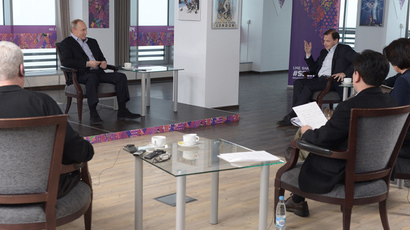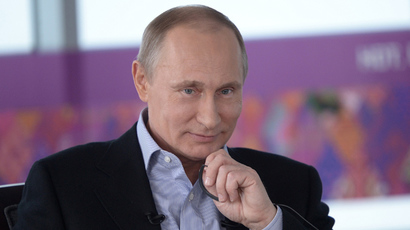Sochi Olympics venues, sports infrastructure most modern in the world – IOC official
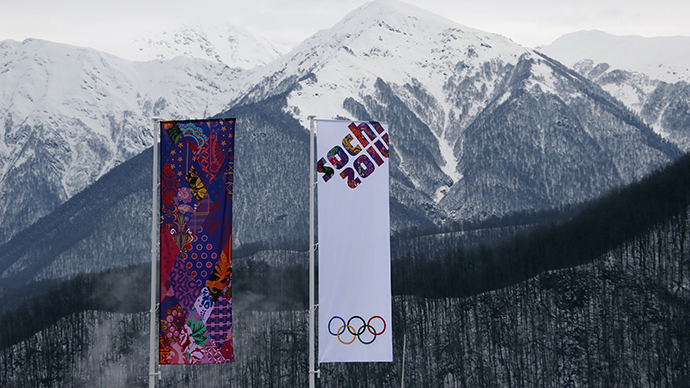
With only a few days left before the start of the 2014 Olympic Games in Sochi, senior International Olympic Committee member Gian-Franco Kasper has praised preparations and the quality of the sporting venues in an interview with Russian media outlets.
Q:How do you assess the overall preparedness of Sochi for the Games? Did Russia manage to fulfill all its commitments? Because when Russia applied with their bid for the Games, there was nothing prepared in Sochi.
Gian-Franco Kasper: You are right; there was absolutely nothing when they got the Games [during the IOC session] in Guatemala. And it’s an incredible job they did since then, because what we did in the Alps - in the Western Alps - in 150 years, Russia had to do that within five to six years. And it’s incredible that they are ready nowadays with all the new infrastructure. So, I must really say, and I followed it very closely during those six years for the IOC and for FIS [International Ski Federation], I’m more than surprised that they really finished on time and it will be from the infrastructure a great Olympic Games, there is no doubt.
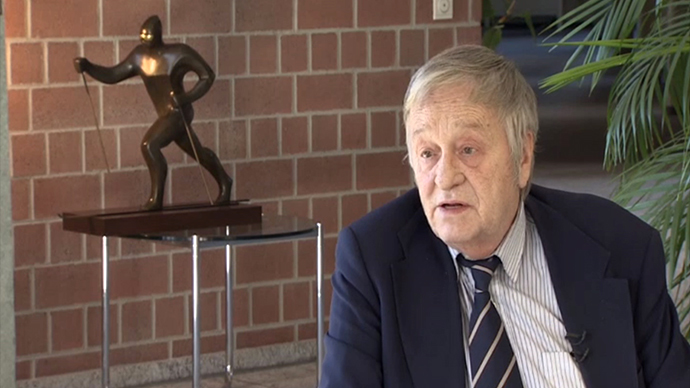
Q:And how do you assess the activities of the Russian Ski Association in Russia and its contribution to FIS?
GK: Well, we have had a very close cooperation of course with the Russian Ski Association for many, many years in all our disciplines - cross country, jumping, freestyle, snowboard, and alpine skiing. We have very close cooperation and we have Mr. Bokarev, we have a member in the FIS council, so the collaboration is really close and in several of our technical committees, we have of course also representatives from Russian skiing. So I really must say it is a close cooperation we share really well.
Q:And could you tell about your relationship with the direction of the Russian Ski Association and have you established a constant interaction?
GK: Of Course. As I said, we have a member of our council from Russia, so we have very close contact. And also within technical committees, the relationship is working every day, more or less. And Russia is one of our big skiing nations, particularly of course in cross-country in the [recent] years, where it is an important skiing nation. It is one of the top nations, so our relations must be good.
Q:And what do you expect from the Sochi Olympics?
GK: Well I hope they will be great Games. In principle, there is no doubt on the infrastructure and preparations – everything seems to be ok. There are some – not doubts, fears if you want – in regard to the weather but you cannot control it, we cannot control it. We had at every Olympics that I remember, some postponements of competitions because of fog or because of big snowfall. This is very normal. We are an outdoor sport, so we have to live with that. We fear that, of course, it complicates things, but that can happen everywhere. That is absolutely nothing new.
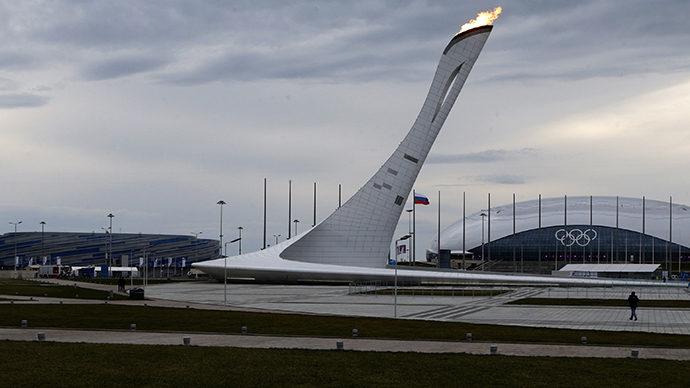
Q:Mr. Kasper, you caused quite a reaction in international media when you said that around one-third of the budget for the Olympic Games in Russia was stolen because of corruption. Did you say that, or is that some sort of translation issue? What is this based on?
GK: Well, I for sure did not say that in this way. And I think your president, Mr. Putin, also had a look or a listen to the tape of this interview, and he had confirmed that I did not say it in this way. Not at all. I said, “There are rumors, people are saying that…” I would not have any figures anyhow. But it did create big waves in the international media, for what reason I do not know. And don’t forget the interview was in Swiss German and the article about it then came from an American journalist, so I do not think he understood one word of Swiss German.
Q:You’ve said some good words about the infrastructure for the Olympic Games in Sochi, but what do you think about the city itself? Would you go skiing there yourself?
GK: Well I can tell you will have the most modern venues and stadiums that exist in the world because they are brand new, and I must say that our Russian friends developed the area in Sochi particularly for sports in an excellent way, with experts from all over the world. The city of Sochi I do not know very well. I have stayed there more than a dozen times, but not in the city; out in the mountains. I think from that point of view, everything will be ok.
Q:You are probably one of the biggest experts on Olympic skiing. Can you compare Sochi’s venue with other projects and infrastructure?
GK: They are the most modern installations technically. We have excellent ski courses, we have brand new jumping hills, we have excellent cross-country tracks. I think this is quite normal, at every winter Games and at every Olympic Games, we always have the newest of the newest, the best of the best. This is quite normal. This is for the athletes, that is important. But in our case, in skiing - particularly in Alpine skiing - you need the right mountains. And I can tell you after the test events we had in World Cups and so on, that the courses are very good. You cannot compare them with the most difficult ones in the world, which is good…because at the Olympics you do not only have top athletes, but you have athletes from many nations, so they have to be safe on those courses. I’m convinced, and I’ve heard many athletes who have tested the courses, that they are more than happy.
Q:Lindsey Vonn won’t be taking part in the Sochi Olympics. Do you think this will affect the audience in a negative way? Or do you think this will be compensated by the participation of Vanessa Mae?
GK: Well there might be top athletes which are not in Sochi. This is quite normal. And you speak a lot about those athletes missing at the beginning but immediately after the completion, it is the new winner and nobody really cares about the old athletes which were not present. I’m sorry for Lindsey Vonn that she cannot make it, but she had an accident, and there are many other athletes unfortunately that have had accidents too. So I do not think that has any influence on the Games.
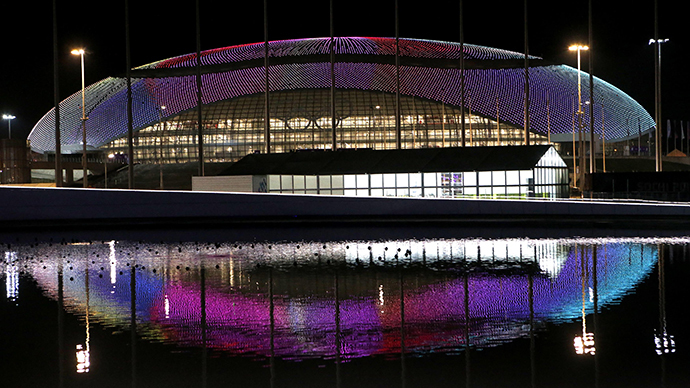
Q:How actively will FIS use the Olympic venues after the Sochi Games are over?
GK: Honestly, I really hope that we’ll have the possibilities to reuse those new installations. It will be a pity to have the best possible completions to sit and not be used. [Skiing] is not easy to come into the calendars, particularly alpine skiing, but I hope that Sochi might participate every year.In ski jumping, we already have plans to come back to Sochi. So things have to develop, and our people, our technicians, want to see first the outcome of the Olympics and then start doing the calendars for the coming years.
Q:You have huge experience regarding Olympic Games. Judging from this experience, when countries build so many new facilities from scratch - like Russia just did - how does this affect the future sports spirit in the country, especially for the younger generation? What usually happens after the Olympics are over?
GK: Well you know it was really the time that we have a big ski resort or a winter sport resort in Russia; we have never had that. And Russia is such a huge country with a lot of winter sports people, so I really think it was more than necessary to have such a resort. And I hope that will also help the development, not only for skiing in general, for normal people, but also for the athletes who will have academies there in ski jumping, freestyle, and so on. This for sure is important for the promotion of our sport.
It takes a lot of work, of course, to promote tourism after the Games. Normally, the year after the Games, you have a lot of tourists coming. They are curious and they want to see where the Olympics took place, and so on. But what they have to do is develop tourism in the next 10-15 years. That is not easy in today’s world, but they have an excellent chance now to show what they have.
Q:Why didn’t you raise the corruption awareness earlier, instead of just a few weeks before the Games?
GK: Look, it never came from my side. I was just asked by the journalist: “[Was 30 percent of the budget stolen due to corruption?]” and I said, “Well, I have heard those rumors too.” We had no reason whatsoever to bring that up in any meeting. If we would have had real facts, we would have done this, but to tell you honestly, we did not have any facts and this was never an item for discussion. And you know, a certain corruption in building business exists all over the world. But this is nothing new. There is no sense to make a scandal out of it. I think your Russian authorities know very well what has happened there and it’s up to them to control their own people and it is for sure not up to us.
Q:What do you wish for Russian athletes competing in the Games?
GK: Well, as many medals as possible. That is the best for the Olympics, of course, and the best for winter sports in Russia. I cannot influence that, but I hope they are ready and they will do their job.













